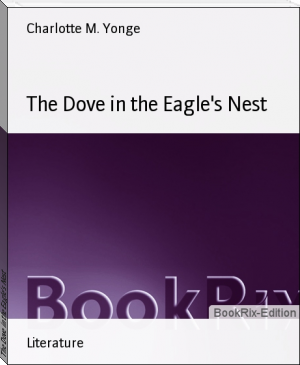The Dove in the Eagle's Nest, Charlotte M. Yonge [i want to read a book txt] 📗

- Author: Charlotte M. Yonge
Book online «The Dove in the Eagle's Nest, Charlotte M. Yonge [i want to read a book txt] 📗». Author Charlotte M. Yonge
“And well am I thankful that so it should be,” said Christina. “Ah, Ebbo! sorely should I have pined with anxiety when thou wast gone. And thy father knows that thou hadst the full purpose.”
“Yea, I know it,” said the old man; “and, after all, small blame to him even if he had not. He never saw me, and light grieves the heart for what the eye hath not seen.”
“But,” added the wife, “since the Romish king freed you, dear lord, cared he not better for your journey than to let you come in this forlorn plight?”
This, it appeared, was far from being his deliverer’s fault. Money had been supplied, and Sir Eberhard had travelled as far as Aosta with a party of Italian merchants; but no sooner had he parted with them than he was completely astray. His whole experience of life had been as a robber baron or as a slave, and he knew not how to take care of himself as a peaceful traveller; he suffered fresh extortions at every stage, and after a few days was plundered by his guides, beaten, and left devoid of all means of continuing the journey to which he could hardly hope for a cheerful end. He did not expect to find his mother living,—far less that his unowned wife could have survived the perils in which he had involved her; and he believed that his ancestral home would, if not a ruin, be held by his foes, or at best by the rival branch of the family, whose welcome of the outlawed heir would probably be to a dungeon, if not a halter. Yet the only magnet on earth for the lonely wanderer was his native mountain, where from some old peasant he might learn how his fair young bride had perished, and perhaps the sins of his youth might be expiated by continual prayer in the hermitage chapel where his sister lay buried, and whence he could see the crags for which his eye and heart had craved so long with the home-sickness of a mountaineer.
And now, when his own Christina had welcomed him with all the overflow of her loving heart, unchanged save that hers had become a tenderer yet more dignified loveliness; when his gallant son, in all the bloom of young manhood, received him with dutiful submission; when the castle, in a state of defence, prosperity, and comfort of which he had never dreamt, was again his own;—still the old man was bewildered, and sometimes oppressed almost to distress. He had, as it were, fallen asleep in one age of the world, and wakened in another, and it seemed as if he really wished to defer his wakening, or else that repose was an absolute novelty to him; for he sat dozing in his chair in the sun the whole of the next day, and scarcely spoke.
Ebbo, who felt it a necessity to come to an understanding of the terms on which they were to stand, tried to refer matters to him, and to explain the past, but he was met sometimes by a shake of the head, sometimes by a nod—not of assent, but of sleep; and his mother advised him not to harass the wearied traveller, but to leave him to himself at least for that day, and let him take his own time for exertion, letting things meantime go on as usual. Ebbo obeyed, but with a load at his heart, as he felt that all he was doing was but provisional, and that it would be his duty to resign all that he had planned, and partly executed, to this incompetent, ignorant rule. He could certainly, when not serving the Emperor, go and act for himself at Thekla’s dower castle of Felsenbach, and his mother might save things from going to utter ruin at Adlerstein; but no reflection or self-reproach could make it otherwise than a bitter pill to any Telemachus to have to resign to one so unlike Ulysses in all but the length of his wanderings,—one, also, who seemed only half to like, and not at all to comprehend, his Telemachus.
Meantime Ebbo attended to such matters as were sure to come each day before the Herr Freiherr. Now it was a question whether the stone for the mill should be quarried where it would undermine a bit of grass land, or further on, where the road was rougher; now Berend’s swine had got into Barthel’s rye, and Barthel had severely hurt one of them—the Herr Freiherr’s interference could alone prevent a hopeless quarrel; now a waggon with ironwork for the mill claimed exemption from toll as being for the Baron: and he must send down the toll, to obviate injustice towards Schlangenwald and Ulm. Old Ulrich’s grandson, who had run away for a lanzknecht, had sent a letter home (written by a comrade), the Baron must read and answer it. Steinmark’s son wanted to be a poor student: the Herr Freiherr must write him a letter of recommendation. Mother Grethel’s ewe had fallen into a cleft; her son came to borrow a rope, and ask aid, and the Baron must superintend the hoisting the poor beast up again. Hans had found the track of a wolf, and knew the hole where a litter of cubs abode; the Freiherr, his wolf-hound, and his spear were wanted for their destruction. Dietrich could not tell how to manage his new arquebus: the Baron must teach him to take aim. Then there was a letter from Ulm to invite the Baron to consult on the tax demanded by the Emperor for his Italian war, and how far it should concern the profits of the bridge; and another letter from the Markgraf of Wurtemburg, as chief of the Swabian League, requesting the Lord of Adlerstein to be on the look-out for a band of robbers, who were reported to be in neighbouring hills, after being hunted out of some of their other lurking-places.
That very night, or rather nearly at the dawn of a summer morning, there was a yelling below the castle, and a flashing of torches, and tidings rang through it that a boor on the outskirts of the mountain had had his ricks fired and his cattle driven by the robbers, and his young daughters carried off. Old Sir Eberhard hobbled down to the hall in time to see weapons flashing as they were dealt out, to hear a clear decided voice giving orders, to listen to the tramp of horse, and watch more reitern pass out under the gateway than ever the castle had counted in his father’s time. Then he went back to his bed, and when he came down in the morning, found all the womankind of the castle roasting and boiling. And, at noon, little Thekla came rushing down from the watch-tower with news that all were coming home up the Eagle’s Steps, and she was sure her baron had sent her, and waved to her. Soon after, her baron in his glittering steel rode his cream-coloured charger (once Friedel’s) into the castle court, followed by his exultant merrymen. They had overtaken the thieves in good time, made them captives, and recovered the spoil unhurt; and Heinz and Koppel made the castle ring with the deed of their young lord, who had forced the huge leader of the band to the earth, and kept him down by main strength till they could come to bind him.
“By main strength?” slowly asked Sir Eberhard, who had been stirred into excitement.
“He was a loose-limbed, awkward fellow,” said Ebbo, “less strong than he looked.”
“Not only that, Sir,” said Heinz, looking from his old master to his young one; “but old iron is not a whit stronger than new steel, though the one looks full of might, and you would think the other but a toy.”
“And what have you done with the rogues’ heads?” asked the old knight. “I looked to see them on your spears. Or have you hung them?”
“Not so, Sir,” said Ebbo. “I sent the men off to Stuttgard with an escort. I dislike doing execution ourselves; it makes the men so lawless. Besides, this farmer was Schlangenwalder.”
“And yet he came to you for redress?”
“Yes, for Sir Dankwart is at his commandery, and he and I agreed to look after each other’s lands.”
Sir Eberhard retired to his chair as if all had gone past his understanding, and thence he looked on while his son and wife hospitably regaled, and then dismissed, their auxiliaries in the rescue.
Afterwards Christina told her son that she thought his father was rested, and would be better able to attend to him, and Ebbo, with a painful swelling in his heart, approached him deferentially, with a request that he would say what was his pleasure with regard to the Emperor, to whom acknowledgments must in the first place be made for his release, and next would arise the whole question of homage and investiture.
“Look you here, fair son,” said Sir Eberhard, rousing himself, “these things are all past me. I’ll have none of them. You and your Kaisar understand one another, and your homage is paid. It boots not changing all for an old fellow that is but come home to die.”
“Nay, father, it is in the order of things that you should be lord here.”
“I never was lord here, and, what is more, I would not, and could not be. Son, I marked you yesterday. You are master as never was my poor father, with all the bawling and blows that used to rule the house, while these fellows mind you at a word, in a voice as quiet as your mother’s. Besides, what should I do with all these mills and bridges of yours, and Diets, and Leagues, and councils enough to addle a man’s brain? No, no; I could once slay a bear, or strike a fair stroke at a Schlangenwalder, but even they got the better of me, and I am good for nothing now but to save my soul. I had thought to do it as a hermit up there; but my little Christina thinks the saints will be just as well pleased if I tell my beads here, with her to help me, and I know that way I shall not make so many mistakes. So, young Sir, if you can give the old man a corner of the hearth while he lives, he will never interfere with you. And, maybe, if the castle were in jeopardy in your absence, with that new-fangled road up to it, he could tell the fellows how to hold it out.”
“Sir—dear father,” cried the ardent Ebbo, “this is not a fit state of things. I will spare you all trouble and care; only make me not undutiful; take your own place. Mother, convince him!”
“No, my son,” said Sir Eberhard; “your mother sees what is best for me. I only want to be left to her to rest a little while, and repent of my sinful life. As Heinz says, the rusty old iron must lie by while the new steel does the work. It is quiet that I need. It is joy enough for me to see what she has made you, and all around. Ah! Stine, my white dove, I knew thine was a wise head; but when I left thee, gentle little frightened, fluttering thing, how little could I have thought that all alone, unaided, thou wouldst have kept that little head above water, and made thy son work out all these changes—thy doing—and so I know they are good and seemly. I see thou hast made him clerkly, quick-witted, and yet a good knight. Ah! thou didst tell me oft that our lonely pride was not high nor worthy fame. Stine, how didst do it?”
“I did it not, dear husband; God did it for me. He gave the boys the loving, true tempers that worked out the rest! He shielded them and me in our days of peril.”
“Yes, father,” added Ebbo, “Providence guarded us; but, above all, our chief blessing has been the mother who has made one of us a holy saint, and taught the other to seek after him! Father, I am glad you see how great has been the work of the Dove you brought to the Eagle’s Nest.”
CHAPTER XXVTHE STAR AND THE SPARK
The year 1531 has begun, and Schloss Adlerstein remains in its strength on the mountain side, but with a look of cultivation on its environs such as would have amazed Kunigunde. Vines run up trellises against the rocks; pot-herbs and flowers nestle in the nooks; outbuildings cluster round it; and even the grim old keep has a range of buildings connected with it, as if the household had entirely outgrown the capacities of the square tower.
Yet the old hall is still the chief place of assembly, and now that it has been wainscoted, with a screen of carved wood to shut off the draughty passages, and a stove of bright tiles to increase the





Comments (0)